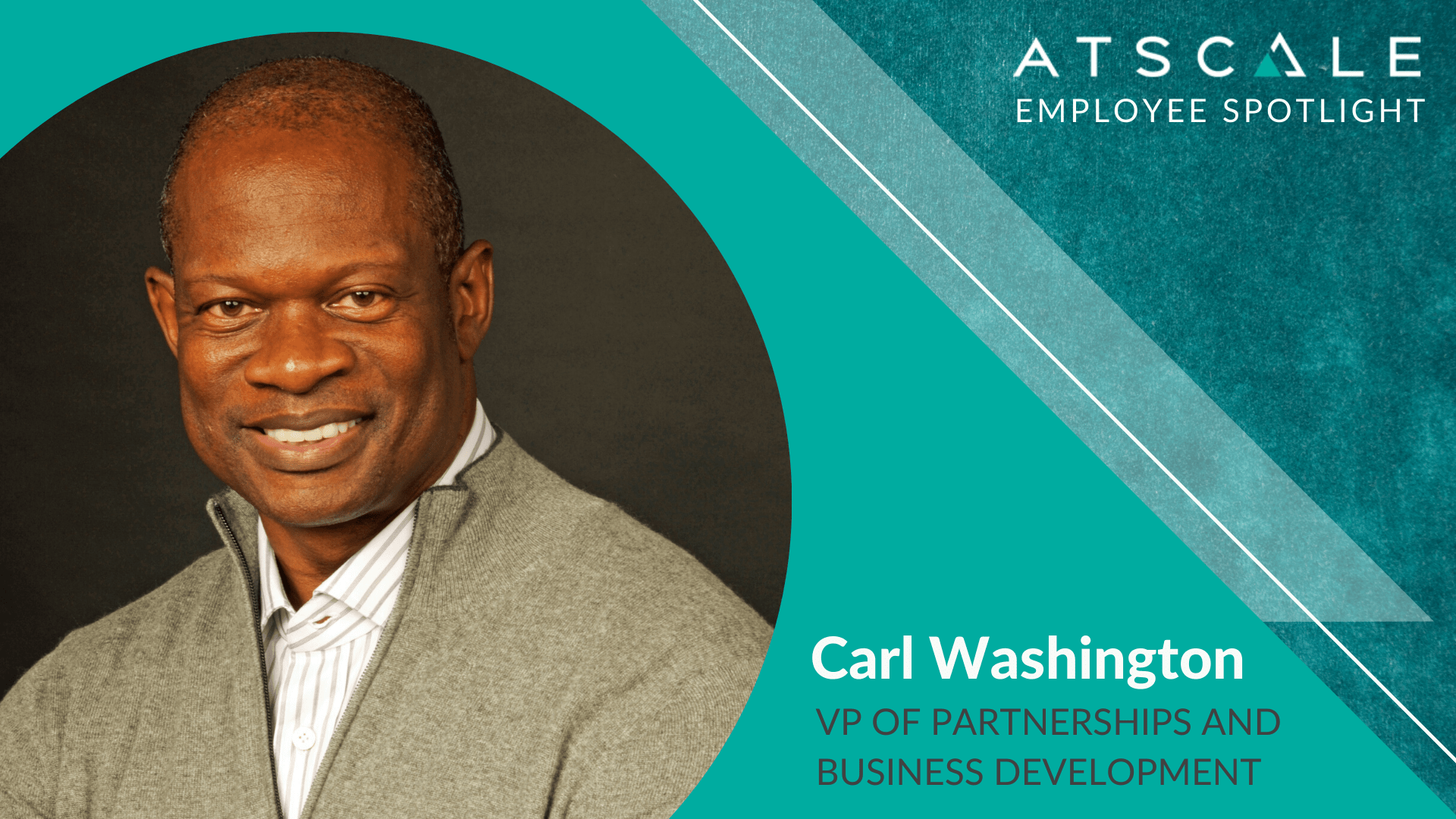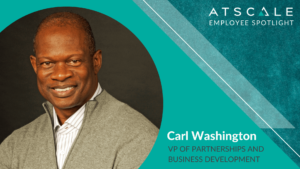

When you join the AtScale team, you join a comradery that is dedicated to transforming what we do to reach the next level. Not only do we strive for success for our team, but we also strive for our partners and customers to reach their goals as well. In this latest interview, we are excited to introduce you to Carl Washington, VP of Partnerships and Business Development here at AtScale who is leading the way.
What is your role at AtScale?
A: I’m responsible for directing the company’s technology alliances and business development efforts. And that’s really to drive meaningful growth and competitive differentiation for AtScale, its partners, as well as their mutual customers.
Can you share what a typical “day in the life” looks like for you in that role?
A: Advancing alignment between AtScale and its partners, which includes a constellation of different actions, is unquestionably a typical “day in the life,” of my role. For example, I engage partners to participate in joint AtScale partner initiatives that deliver value to our mutual customers and prospects. And that can be along the line of more in-depth strategic integration, joint go-to market or joint field engagement. Once they agree, a fair amount of coordination is required between the two organizations. Another example is I recruit AtScale employees to obtain partner certifications along optional technology tracks. These certifications not only advance AtScale status with our strategic partners, which unlock go-to market benefits to AtScale, but they also contribute towards AtScale employees’ personal career development while helping AtScale attract new customers. Being in this role requires coordination across AtScale and the partners functional areas which include: product management, engineering, marketing, sales, finance and the legal departments; and all of that is to drive alignment with our respected organizations.
You’ve spent a few years of your career working as an entrepreneur. Can you talk to us about that experience?
A: I sure can. I wanted to start a business, but I didn’t have an idea for one. Around the same time my son, who has low vision, was entering middle school. We noticed that even when he sits in the first row of a classroom it’s difficult for him to see information that is written on the board. This sparked the inspiration of my idea for a business. Along with a friend, we designed a mobile product, similar to a pencil grip, that would attached to any writing instrument (i.e. chalk, marker) and capture, via a micro-optical system, content written on any surface (i.e. chalk or whiteboard), and then electronically transmit that information to any mobile device, laptop, or computer. That way, my son would be able to see information written on any surface at distances comfortable to him, in real-time, but from an electronic tablet. We got to the prototype phase and determined that the cost to go through multiple prototypes and then manufacture at scale was going to be more expensive and riskier than we were willing to incur. So, we decided to shelve the idea for another day.
Throughout your career, you’ve also held positions at larger companies such as Dell, EMC, IBM, and Hewlett Packard Enterprise. How did your journey lead you to working at AtScale?
A: I think back to my experience at FilePool, a software startup where I played an instrumental role in convincing EMC to acquire the company. I missed the dynamic and entrepreneurial culture as well as the comradery startup environments frequently cultivate, especially if the startup scales or has a successful exit. Startups were included in my criteria for my next job. I was also looking for a technology startup whose products are positioned further up the technology stack from where I came from, which was storage technologies for big data, artificial intelligence, machine learning and analytics. Coincidentally at the same time as my job search began, I received a LinkedIn notification that one of my connections, Mike Bridges, who I worked for at EMC, started a new job at AtScale. I researched AtScale and quickly realized it fit my job criteria perfectly, so I reached out to Mike and the “rest is history.”
What are the benefits of working at a startup company?
A: It really depends on the individual, their personality and what type of environment they’re comfortable in or what challenges they look for. For me, the key benefits are about learning and growing. You certainly learn many new skills in a startup environment, such as self-learning, how to be adaptable, and taking on multiple roles to the extent you’re not isolated to one particular area. Acquiring these skills provide enormous growth opportunities. Along with that, I’m jazzed by the challenges of scaling a business and being part of that process to help a business go from its current level to the next level and beyond. You need to roll up your sleeves to get the job done; I thrive in this type of environment. There’s obviously the stock incentive, if offered, and that is a benefit as well, especially if the company continues to scale and gets to the point where it has a successful exit.
What makes AtScale and our solution unique?
A: AtScale provides value along a number of use cases, but the one that I find really unique is that AtScale saves enterprise companies up to 90% of their analytics costs. That’s a significant number, I haven’t seen anywhere in the market. Organizations can apply these savings to innovation initiatives. That’s huge.
Can you recall a proud moment since you joined the AtScale team?
A: A recent one is a result of the current coronavirus pandemic. It was an incredibly proud moment for me to collaborate with other AtScalers and one of our key partners, Tableau, in helping organizations during these difficult times. Together, we made available, at no cost, AtScale’s Cloud OLAP models with Tableau’s data visualizations to organizations, so they could perform multidimensional analysis on public COVID-19 datasets. AtScale and Tableau’s technologies are helping organizations come up with strategies to determine how to bring employees back to work safely.
It is a great feeling to know that we’re all in this together, contributing to the collective well-being of the community by providing tools to organizations to help them on their path to the new normal.
What is an interesting fact that people may be surprised to learn about you?
A: Believe it or not, I was attacked by a great white shark in the Indian Ocean off the coast of South Africa and I survived to tell you about my experience. The shark was anywhere between 16-20 feet long, and it attacked me. In full transparency, I was in a shark cage with about four or five other people. When we were submerged under water, we were there for about 20-30 minutes and the boat operators were throwing chum out to attract the sharks. My friends warned me because I had my feet on the edge of the cage, but I ignored them because I was enjoying watching the shark and about five to ten minutes later all of a sudden, the shark locks its eyes on me. It came right at the cage, where I was positioned, very fast and everybody, especially me, jumped way back and the boat operators pulled the cage up out of the water pretty quickly. It was definitely a scary moment but a thrilling experience, one I’ll never forget.
When you’re not in the office, where are people most likely to find you?
A: Usually on an airplane traveling the world, going somewhere exotic with my family or a few of my friends. I love traveling, when I have the time and I can do it. I prefer traveling someplace where I’ve never been and the more exotic the better. However, given the current pandemic, people can find me in my backyard with a glass of red wine or a cold glass of beer, just sitting back, enjoying nature, and planning my next trip.


SHARE
Guide: How to Choose a Semantic Layer